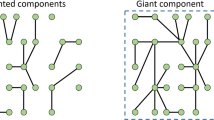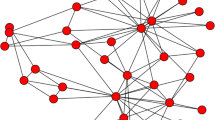Abstract
We show that various paradoxes can arise in a natural class of social networks. They demonstrate that more services or products may have adverse consequences for all members of the network and conversely that restricting the number of choices may be beneficial for every member of the network. These phenomena have been confirmed by a number of empirical studies. In our analysis we use a simple threshold model of social networks introduced in Apt and Markakis (2011), and more fully in Apt and Markakis (2014). In this model the agents, influenced by their neighbours, can adopt one out of several alternatives. We identify and analyze here four types of paradoxes that can arise in these networks. These paradoxes shed light on possible inefficiencies arising when one modifies the sets of products available to the agents forming a social network or the network structure. One of the paradoxes corresponds to the well-known Braess paradox in congestion games and shows that by adding more choices to a node, the network may end up in a situation that is worse for everybody. We exhibit a dual version of this, according to which removing a product available to an agent can eventually make everybody better off. The other paradoxes that we identify show that by adding or removing a product from the choice set of an agent may lead to permanent instability. Finally, we also identify conditions under which some of these paradoxes cannot arise.














Similar content being viewed by others
References
Apt, K. R., & Markakis, E. (2011). Diffusion in social networks with competing products. In Proceedings of 4th International Symposium on Algorithmic Game Theory (SAGT11), volume 6982 of Lecture Notes in Computer Science (pp. 212–223). Springer.
Apt, K. R., & Markakis, E. (2014). Social networks with competing products. Fundamenta Informaticae, 29, 1–26.
Apt, K. R., & Simon, S. (2013). Social network games with obligatory product selection. In Proceedings of 4th International Symposium on Games, Automata, Logics and Formal Verification (GandALF ’13).
Chamley, C. P. (2004). Rational herds: Economic models of social learning. Cambridge: Cambridge University Press.
Easley, D., & Kleinberg, J. (2010). Networks, crowds, and markets. Cambridge: Cambridge University Press.
Fotakis, D., Kaporis, A. C., Lianeas, T., & Spirakis, P. G. (2012). On the hardness of network design for bottleneck routing games. In SAGT, pp. 156–167.
Fotakis, D., Kaporis, A. C., & Spirakis, P. G. (2012). Efficient methods for selfish network design. Theoretical Computer Science, 448, 9–20.
Gigerenzer, G. (2008). Gut feelings: The intelligence of the unconscious. Penguin. Reprint edition.
Goyal, K. R., & Kearns, M. (2012). Competitive contagion in networks. In Proceedings of the Symposium on Theory of Computing (STOC) (pp. 759–774).
Goyal, S. (2007). Connections: An introduction to the economics of networks. Princeton: Princeton University Press.
Jackson, M. (2008). Social and economic networks. Princeton: Princeton University Press.
Kearns, M., Littman, M., & Singh, S. (2001). Graphical models for game theory. In Proceedings of the 17th Conference in Uncertainty in Artificial Intelligence (UAI ’01) (pp. 253–260). Morgan Kaufmann.
Milchtaich, I. (1996). Congestion games with player-specific payoff functions. Games and Economic Behaviour, 13, 111–124.
Monderer, D., & Shapley, L. S. (1996). Potential games. Games and Economic Behaviour, 14, 124–143.
Morris, S. (2000). Contagion. The Review of Economic Studies, 67(1), 57–78.
Nisan, N., Roughgarden, T., Tardos, É., & Vazirani, V. V. (Eds.). (2007). Algorithmic game theory. Cambridge: Cambridge University Press.
Rogers, E. M. (2003). Diffusion of Innovations (5th ed.). New York: Free Press.
Rosenthal, R. W. (1973). A class of games possessing pure-strategy Nash equilibria. International Journal of Game Theory, 2, 65–67.
Simon, S., & Apt, K. R. (2012). Choosing products in social networks. In Proceedings 8th International Workshop on Internet and Network Economics (WINE), volume 7695 of Lecture Notes in Computer Science (pp. 100–113). Springer.
Simon, S., & Apt, K. R. (2015). Social network games. Journal of Logic and Computation, 1(25), 207–242.
Tzoumas, V., Amanatidis, C., & Markakis, E. (2012). A game-theoretic analysis of a competitive diffusion process over social networks. In Proceedings of 8th International Workshop on Internet and Network Economics (WINE), volume 7695 of Lecture Notes in Computer Science (pp. 1–12). Springer.
Vega-Redondo, F. (2007). Complex social networks. Cambridge: Cambridge University Press.
Acknowledgments
We thank the referees for helpful comments and for suggesting several ways of im- proving the presentation. First author is also a Visiting Professor at the University of Warsaw. He was partially supported by the NCN Grant nr 2014/13/B/ST6/01807.
Author information
Authors and Affiliations
Corresponding author
Rights and permissions
About this article
Cite this article
Apt, K.R., Markakis, E. & Simon, S. Paradoxes in social networks with multiple products. Synthese 193, 663–687 (2016). https://doi.org/10.1007/s11229-015-0864-4
Received:
Accepted:
Published:
Issue Date:
DOI: https://doi.org/10.1007/s11229-015-0864-4




